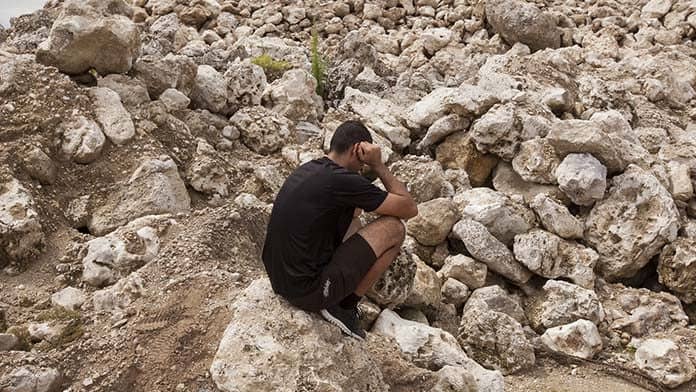Australia’s detention regime on Nauru is spiralling out of control. The mental health crisis is accelerating among all age groups. And Nauruan elites and Australian officials are locked into a war of attrition against refugees.
Refugee service providers such as IHMS are increasingly unable to cope, with their clinic inside the RPC 1 compound breaching capacity on multiple occasions.
Following the failure to provide adequate care, a stream of Federal Court orders have forced the Australian government to transport dozens of refugees at imminent risk to Australia. Air ambulances are being used almost weekly to take desperately ill refugees for medical help in Australia.
Pouring fuel on the fire is a Nauruan elite addicted to detention. Officials are panicking that the crisis may threaten the feasibility of Australia’s detention regime, and the tens of millions of dollars of Australian government money that pour into their pockets every year.
Nauru government officials are pulling out all stops to block refugee transfers off Nauru. They have stopped air ambulances landing, and denied exit permits to those seeking to leave the island.
They are increasingly hostile to the medical services that have been referring refugees to proper medical treatment. They have prevented IHMS taking patients into the clinic in the RPC 1 compound. Refugees have been ordered out of the Nauru hospital by Nauruan police. The panicked elite have even ordered Médecins Sans Frontières off the island, which has offered psychological and psychiatric help since 2017.
A new Nauru government order threatens any refugee who attempts suicide with arrest. In the last week of September, an Iranian refugee woman was handcuffed, arrested and taken to the police station after informing IHMS workers she was having suicidal thoughts.
A twisted development has seen Nauru using child protection orders to tear legal custody of refugee children from parents in order to prevent transfers, and to intimidate other refugees.
The Australian government—which has spent $320,000 in the last financial year fighting court battles against medical transfers of refugees—is hardly worried about Nauru’s campaign to prevent removals.
But an escalating war of attrition can only deepen the crisis for the Australian government—and for the refugees it continues to hold in torture camps.
Reports of Australia’s bloody fingerprints on Nauru’s actions continue to roll in—from revelations of Australian government endorsement of Nauru’s media bans, to reports to the Federal Court about ABF’s joint decision-making with Nauru’s Overseas Medical Referral committee. Even Justice Debra Mortimer has ruled in the Federal Court that Australia cannot buck responsibility, having, “created this situation by establishing an arrangement of this kind for regional processing”.
As long as Australian detention dollars roll into the island, Nauru’s elite will continue to keep refugees trapped. The Australian government has guaranteed them $31.5 million per year for operating refugee processing, as well as an additional $26.1 million in Australian aid last year, which together represents 43 per cent of Nauru’s USD$115 million GDP.
Close the camps
The crisis on Nauru has outraged new layers of people, and highlighted the necessity of action. Legal orders can only get refugees to treatment in Australia in the most extreme cases. For most of those on Nauru, there is no legal solution.
The World Vision campaign to get all kids off Nauru by 20 November is garnering support, with over 250 organisations signing on, a poster ad campaign, and academics coordinating a day of action on 17 October. Pressure is mounting on the Labor Left to act in the lead up to Labor’s national conference in December.
A poll in Wentworth found almost two-thirds in favour of bringing refugee children from Nauru to Australia.
The urgent task for refugee activists is to draw new layers into the protests in late October.
More than ever, we need to build the movement to get everyone off and end offshore detention.
By Sophie Cotton






